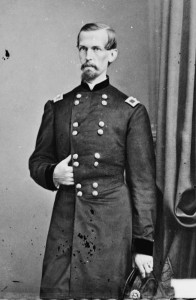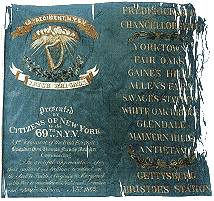In October 1860 the Prince of Wales visited New York City as part of his North American tour. The whole city went gaga over the prince – well almost the whole city. The 69th regiment of the New York State militia refused to parade in honor of the prince. The 69th, led by Colonel Michael Corcoran, was predominantly made up of Irish-Americans. On March 16, 1861 The New-York Times reported on a meeting during which the 69th was honored for its refusal to honor the prince (The New York Times Archive). Here’s some excerpts:
The City Assembly Booms were thronged, last evening, by an assemblage consisting for the most part, as an Hibernian would say, of Irishmen of both sexes, who came together to witness the presentation of a stand of colors to the Sixty-ninth Regiment, N.T.S.M., and of a sword of honor to Col. MICHAEL CORCORAN, its Commander, “as a testimonial,” in the words of the card of invitation, signed by JOHN CLANOY, Chairman, “of sympathy with said regiment and officers in their refusal to perform an extra parade, not prescribed by law, in honor of the Prince of Wales.” The officers and men of the regiment were present, in full uniform. At a little after 8 o’clock they marched in, led by the regimental band, playing the Irish air, “Larry O’Gaff,” amid loud plaudits …
Mr. STOUT concluded by reading a letter from Col. CORCORAN, expressing his regret that he was too ill to be present, declaring it improper for him at this time to say anything about his own trial further than that, enough an American citizen, he was also an Irishman born, and should never forget that the Prince of Wales was the representative of Ireland’s-oppressor, and requesting that Quartermaster TULLY would speak for him. …
Hon. J.W. CHANDLER, now addressing the Quarter-master, made a speech, requesting Col. CORCORAN, through him, to accept the sword which lay on the table as a testimonial for his manly conduct in relating to order a parade of his Regiment in honor of the Prince of Wales. [Groans.] He declared that the Colonel acted strictly in accordance with law and his duty in so refusing, and that he had thus set an example which would call forth a response from every true American citizen, and awaken all to an abhorrence of every species of King-craft. He read a lengthy dissertation on the quality of the liberty enjoyed in this country. In conclusion, he presented the sword, alluding to its power for good or evil, in the hands of worthy or unworthy men, and expressing the belief that, given to Col. CORCORAN, it was given to a brave man.
Quartermaster TULLY, in receiving the sword, said it was a pleasing duty to him, on this occasion, to obey the command of his superior officer, for there was no man in this city in whose shoes he would rather stand. [Applause.] He would not undertake a lengthy reply, but he desired to express Col. CORCORAN’S sense of the generosity of his friends. The sword was an American sword, and it would be the weapon of an American soldier. [Applause.] Should the cause of this Union call for soldiers, this would be one of the first swords unsheathed in support of the Republic. [Applause] Mr. TULLY spoke of the reception of the Prince of Wales in this country, characterizing it as humiliating and unworthy of the independence of Americans. He dwelt upon the wrongs of Ireland, and said it was his belief that the memory of these had something to do with Col. CORCORAN’S action. [Loud applause.] In all parts of the land had come voices of approval of Col. CORCORAN’S conduct, even from California (holding up a medal received by Col. CORCORAN from Irish Californians.) We all had a particular object of regard. The slave longed for liberty, and the Irishman yearned for his native land. [Applause.] It was his firm faith that the day of Ireland’s prosperity and liberty was almost come. In conclusion he returned thanks for the testimonial. [Three cheers.]
The sword was of elegant make, with a double scabbard, the outer one being of gold and ornamented with Irish emblems and the American colors The inscription on one side was as follow: “Presented to Col. CORCORAN, of the Sixty-ninth Regiment.” On the reverse were the words, “In memory of the 11th of October, 1860.”
The colors to be presented to the Regiment were now brought forward amid great applause.
The material of the stand of colors is heavy green silk, magnificently worked in emerald and gold. In the centre is a representation of the ancient flag of Erin –the sun-burst. Upon a scroll above and beneath the central emblem are inscribed in golden letters the same words inscribed upon the sword presented to Col. CORCORAN. …
Michael Corcoran was born in Ireland. According to Wikipedia:
He enlisted as a Private in the 69th New York Militia. By 1859 he was appointed colonel of the regiment. The regiment was a state militia unit at that time composed of citizens, not soldiers, and was involved in the maintenance of public order. On October 11, 1860, Colonel Corcoran refused to march the regiment on parade for the 19-year old Prince of Wales, who was visiting New York City at the time, as a protest to the ineffective British response to the Irish Famine. Corcoran was removed from command and a court martial was pending over that matter when the Civil War began. …
With the outbreak of war, the court martial was dropped and Corcoran was restored to his command because he had been instrumental in bringing other Irish immigrants to the Union cause.
It seems Corcoran’s Court-martial was interrupted because he could deliver the troops.
Both Corcoran and the 69th were actively involved in the war.



Pingback: The Streets Will Get Cleaned | Blue Gray Review
Pingback: Invading Virginia’s “Sacred Soil” | Blue Gray Review
Pingback: Going to Market in Richmond | Blue Gray Review